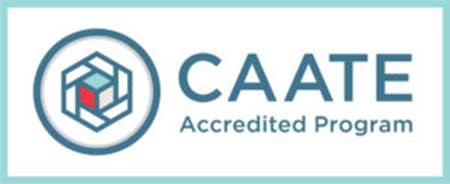Master of Science in Athletic Training
Incoming students interested in pursuing a master’s degree in athletic training should pursue a bachelor's degree in any program and obtain the necessary prerequisites.
Potential undergraduate programs at Western Carolina University include Integrated Health Sciences, Emergency Medical Care, or Recreational Therapy.
Virtual Open House
Thursday, May 2, 2024: 5-6:30 p.m.
Join us at one of our upcoming virtual Graduate School Open House events on Zoom! You'll have the opportunity to learn more about Western Carolina University, understand the Graduate School application process, and meet key program representatives.
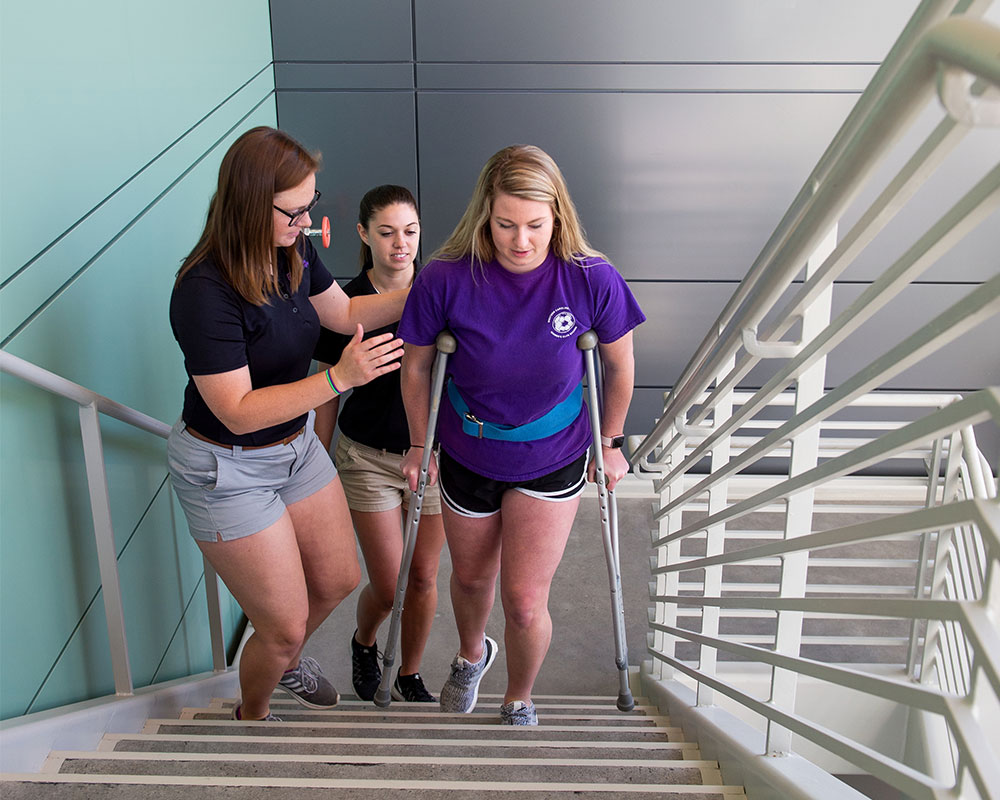
Athletic Trainers (ATs) are healthcare professionals who provide patient-centered care in collaboration with a physician. As part of the healthcare team, services provided by ATs include injury and illness prevention, wellness promotion and education, emergent care, examination and clinical diagnosis, therapeutic intervention, and rehabilitation of injuries and medical conditions.
The Master of Science in Athletic Training (MSAT) program prepares graduates to be professionally engaged while delivering high quality patient-centered care as athletic trainers.The MSAT is a 2-year, 6-semester program that combines didactic education with diverse clinical experiences.
Through a comprehensive and innovative experience, the Western Carolina University Athletic Training Program aspires to be a recognized leader in preparing highly skilled and professionally progressive leaders in the field of athletic training.
Why MSAT at WCU?
|
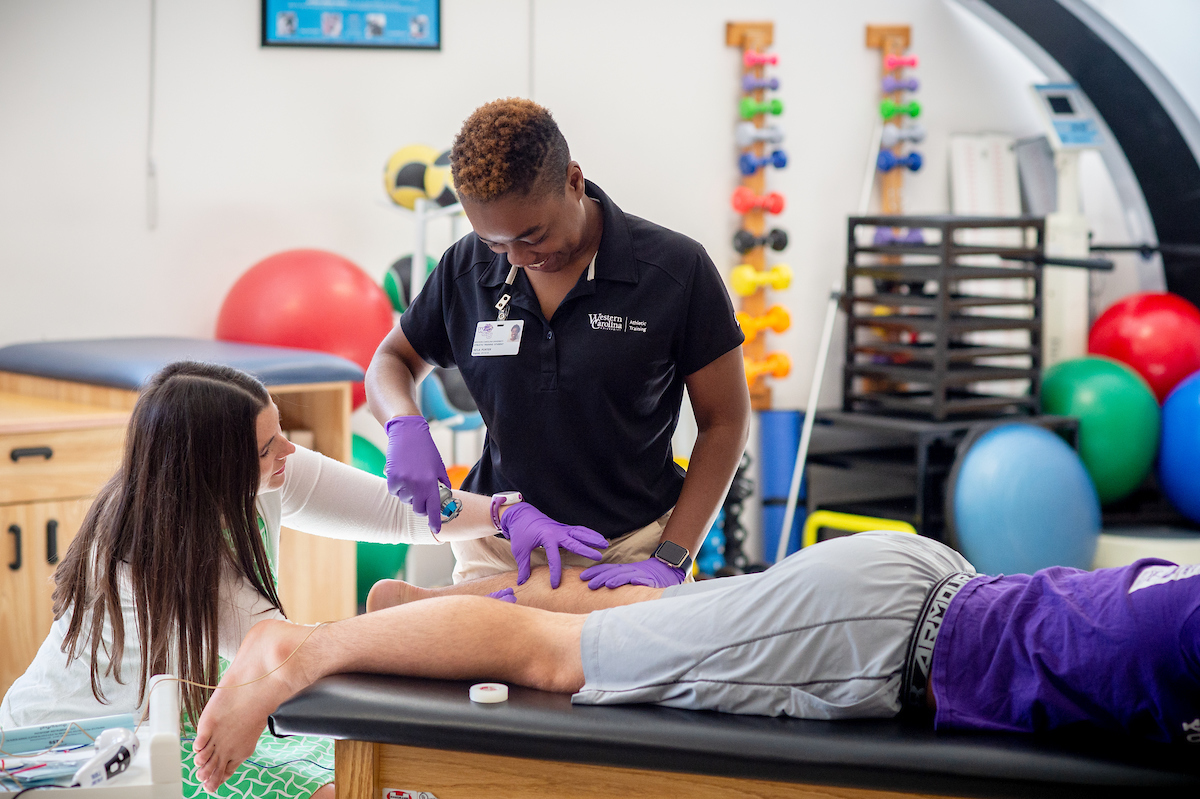
Students in program frequently receive student scholarships through the NCATA, MAATA, and NATA Foundation
Application Deadlines
Early Application Deadline: October 15th
Regular Application Deadline: February 1st
Early Application Information for WCU Juniors
Application Requirements
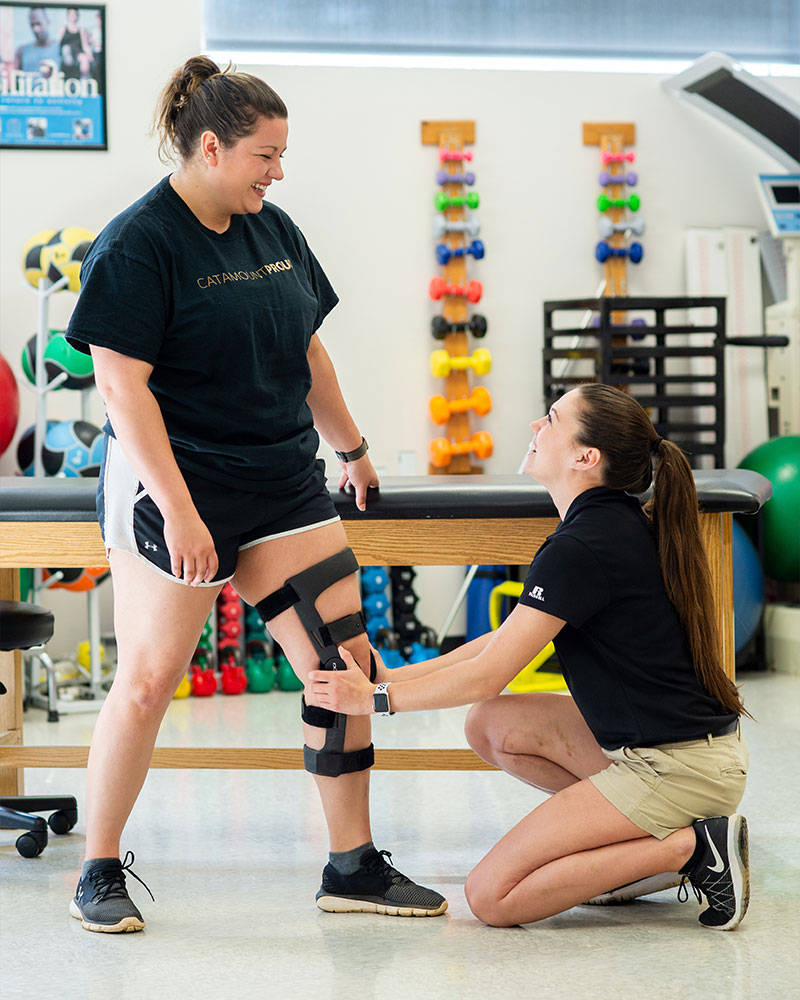
The following are requirements for application to the Master of Science in Athletic Training Program. All of the following requirements must be submitted through ATCAS.
- 50 hours of observation with an athletic trainer
- 3 letters of recommendation- one must be from an athletic trainer
- Statement of Interest/Cover Letter that includes why you want to become an Athletic Trainer
- Resume
- Unofficial Transcript(s)- (official transcripts will need to be sent after acceptance to program and completion of undergraduate degree)
- Required Pre-requisite Courses with a grade of a “C” or higher
- 3 Credits Nutrition
- 8 Credits of Anatomy and Physiology (must include lab)
- 4 Credits Biology (must include lab)
- 4 Credits Chemistry (must include lab)
- 4 Credits Physics (must include lab)
- 3 Credits Psychology (introduction)
GRE is not required. Admission decisions are made based on strength of the application package, including GPA, pre-requisite GPA, letters of recommendation, statement of interest, and interview.
CAATE offers needs based ATCAS fee waivers.
check the fee waiver requirements
more information about Graduate School admission requirements
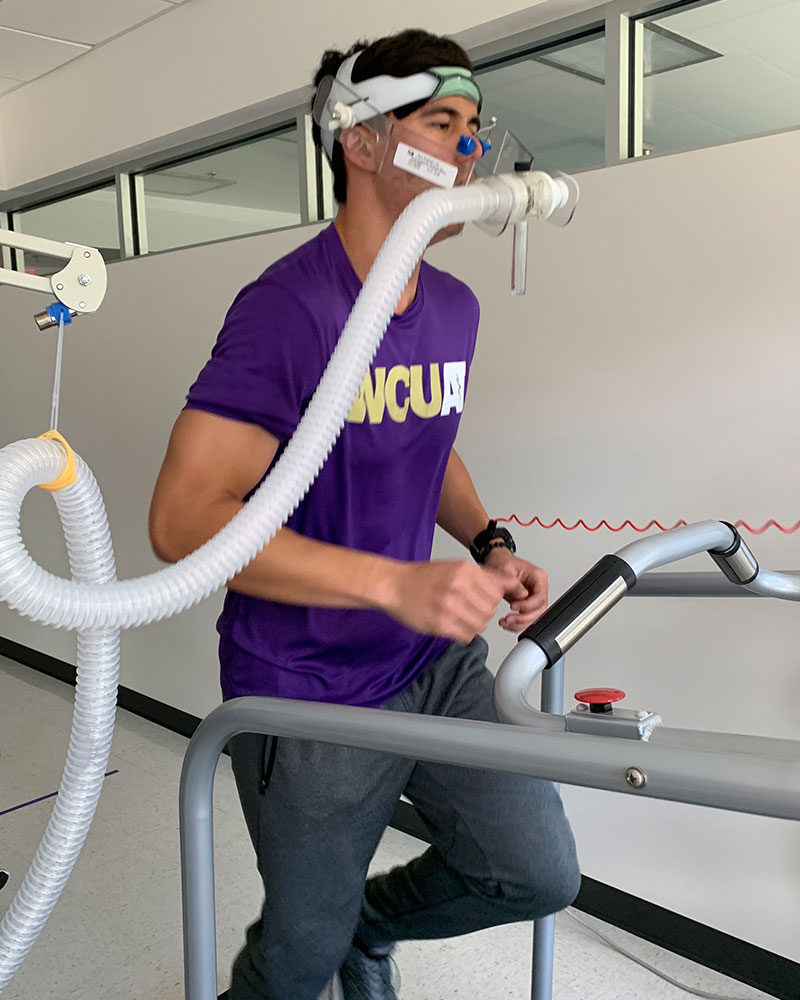
The Master of Science in Athletic Training Program (MSAT) is a full-time program beginning in June.
The current curriculum is 64 credits of both didactic and clinic education courses over two years.
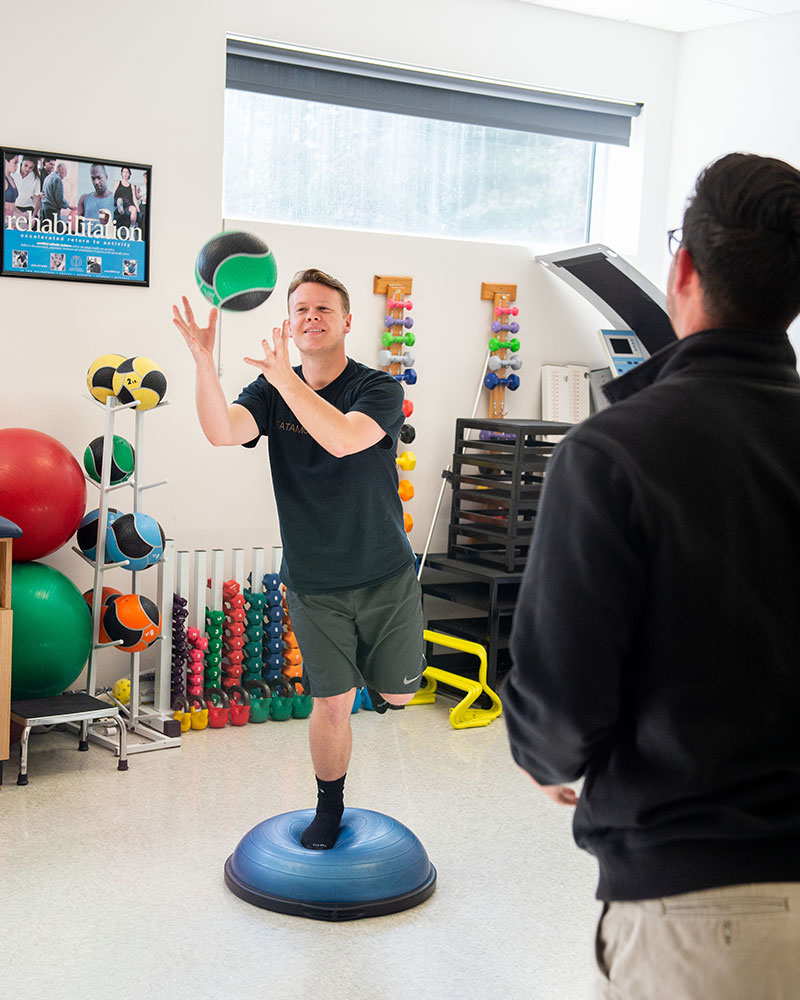
The WCU AT program uses a combination of traditional and immersive clinical experiences.
Students complete clinical rotations at local secondary schools, colleges, and physicians’ offices; additionally, students have opportunities to complete clinical rotations in various settings across the country.
EXPLORE THE TYPES OF CLINICAL EDUCATION EXPERIENCES
Explore the Current Clinical Education Sites
Travel to and from Clinicals
Students will be required to supply their own transportation to and from clinical sites. All costs associated with transportation to and from all clinical education sites will be paid solely by the student.
Clinical Assignments
Students in this program, in addition to normal weekday practices and competition, may be required to complete clinical experiences during weekends, holidays, and vacation periods and/or during semester breaks. Assignments to clinical education sites are based on the requirements of the CAATE, needs of the individual student, and availability of affiliated sites.
Students in the WCU AT will have additional opportunities to grow professionally and give back to the community. Opportunities include:
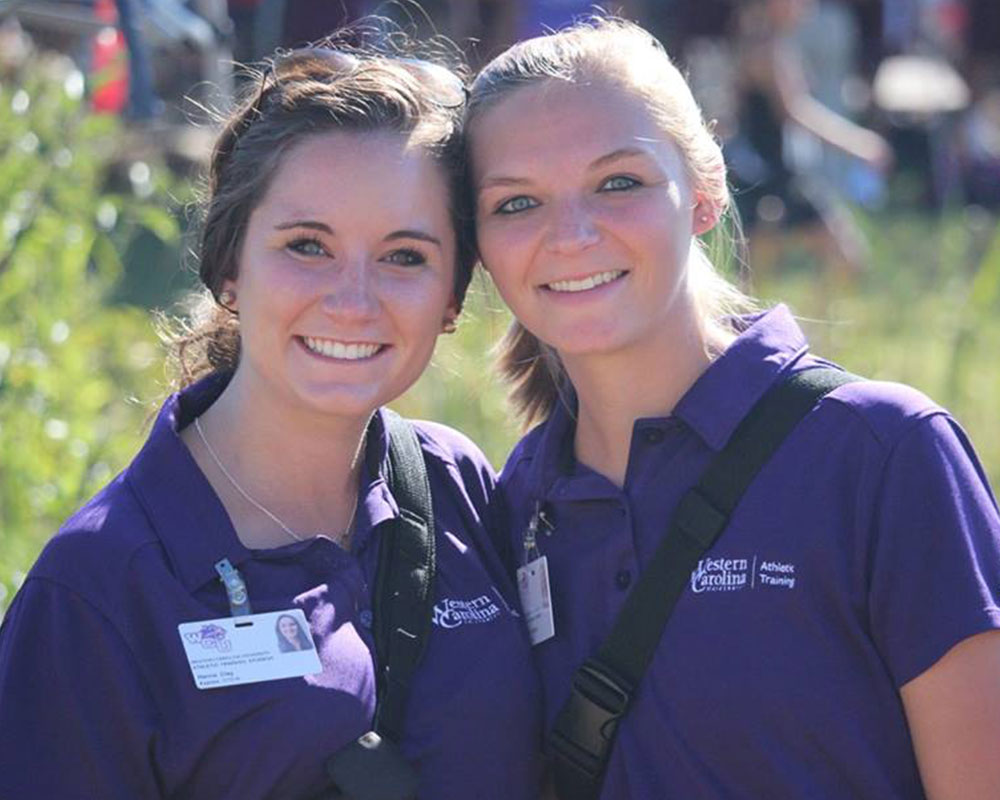
- Scholarship- Original Research or Case Studies
- Conference Attendance- Local, State, District, and National Levels
- Student Positions on Committees- Eg. MAATA Student Senate
- Volunteer Opportunities- Local and State Athletic Events
- Community Service
Athletic training encompasses the prevention, examination, diagnosis, treatment and rehabilitation of emergent, acute or chronic injuries and medical conditions. Athletic training is recognized by the American Medical Association (AMA), Health Resources Services Administration (HRSA) and the Department of Health and Human Services (HHS) as an allied health care profession. Learn more at the National Athletic Trainers’ Association (NATA) website.
Athletic trainers (ATs) are highly qualified, multi-skilled health care professionals who render service or treatment, under the direction of or in collaboration with a physician, in accordance with their education, training and the state's statutes, rules and regulations. As a part of the health care team, services provided by athletic trainers include primary care, injury and illness prevention, wellness promotion and education, emergent care, examination and clinical diagnosis, therapeutic intervention and rehabilitation of injuries and medical conditions.
Athletic trainers are sometimes confused with personal trainers. There is, however, a large difference in the education, skillset, job duties and patients of an athletic trainer and a personal trainer. A personal trainer is a person who prescribes, monitors and changes an individual’s specific exercise program in a fitness or sports setting. Personal trainers may or may not have higher education in health sciences or certification. Athletic trainers are required to pass a national certification exam.
Physical therapists diagnose and treat individuals of all ages, from newborns to people at the end of life. Many patients have injuries, disabilities, or other health conditions that need treatment. But PTs also care for people who simply want to become healthier and to prevent future problems. Physical therapists examine patients and then develop a treatment plan to improve their ability to move, reduce or manage pain, restore function, and prevent disability. While similar, ATs and PTs have different scopes of practice. ATs have a role from prevention, to immediate and emergency care, to long term rehabilitation and return to activity.
Athletic Trainers can work in the following settings:
- Public and private secondary schools, colleges and universities, professional and Olympic sports
- Youth leagues, municipal and independently owned youth sports facilities
- Physician practice, similar to nurses, physician assistants, physical therapists and other professional clinical personnel
- Rural and urban hospitals, hospital emergency rooms, urgent and ambulatory care centers
- Clinics with specialties in sports medicine, cardiac rehab, medical fitness, wellness and physical therapy
- Occupational health departments in commercial settings, which include manufacturing, distribution and offices to assist with ergonomics
- Police and fire departments and academies, municipal departments, branches of the military
- Performing arts including professional and collegiate level dance and music
Curious about a certain setting? Check out NATA-professional interests for more information!
You may apply to the program with any type of degree. You must at least have a bachelor’s degree. Having a degree in exercise science, health sciences, emergency medical care, biology, recreational therapy, nutrition and dietetics, or any other health-related field may be advantageous once in the program.
50 hours are required with an Athletic Trainer.
Check out our application requirements here: M.S. Athletic Training Apply Now
Early Application Deadline: October 15th
Regular Application Deadline: February 1st
- Applicants should have no more than two outstanding courses at the time of application and must have completed all prerequisites at the time of admission to the program.
- Under certain circumstances, with a realistic plan for completing all necessary pre-requisite courses, the Admissions Committee will consider an applicant who has more than two outstanding courses.
Yes!
- Western Carolina University offers scholarships for both undergraduate and graduate students through a single application form. Apply for Scholarships
- Our students have a history of success earning scholarships through the National Athletic Trainers’ Association Research and Education Foundation (NATA Scholarships ), the Mid-Atlantic Athletic Trainers’ Association (MAATA Scholarships ) and through the North Carolina Athletic Trainers’ Association (NCATA Scholarships )
You will register for classes through your myWCU account. The instructions can be found here: Register for classes in myWCU
If you have other health insurance and would like to waive the mandatory UNC system health plan, please visit the website below:
If you do not have other health insurance coverage you must enroll in the UNC system health plan. (see link above)
Yes, this will be needed once clinical experiences begin. Our clinical sites require Basic Life Support for the Healthcare Provider through the American Heart Association.
Unfortunately, no. Transportation and housing, if needed, will have to be paid for by the student.
There are many options for both on and off campus housing in Cullowhee. See the links below for information about housing options.
Tuition and fees are set annually by the Graduate School. During the summer, tuition is charged per credit hour, while during the Fall and Spring semesters, tuition is charged at the full-time rate.
Additional information and the current rates for tuition and fees
Additional information about WCU's withdrawal/drop and refund policy
The Office of Financial Aid can provide information about various types of financial aid options including student loans. Graduate students who are enrolled full-time or half-time are eligible for federal student loans. Students seeking loans must complete the Free Application for Federal Student Aid (FAFSA).
There are multiple WCU scholarships available. Students may complete a single application form for a variety of general scholarships. In order to be considered for scholarships awarded by WCU, students must submit the online scholarship application prior to February 1st and the scholarship will be applied in the following Fall semester.
Students in the Athletic Training Program frequently receive student scholarships through the NCATA, MAATA, and NATA Foundation.
- National Athletic Trainers’ Association (NATA) membership--$78/year
- Check out information about NATA membership benefits
- Conference attendance—students have the opportunity to attend local, state, district, and national conferences throughout their time in the MSAT Program. Conference attendance is encouraged but not required. The MSAT Program participates in an annual fundraiser to pay for hotels associated with conference attendance, but students are responsible for registration fees.
- Board of Certification Examination: $330*
*This cost is through the Board of Certification and is subject to change
There are a few costs associated with completing clinical education experiences throughout the MSAT program, such as onboarding, health and safety requirements, clinical experience tracking, and transportation to clinical experiences. Below is a breakdown of the costs:
- EXXAT Education Management program--$135 first year, $35 second year
- Drug tests--$29x5. These are completed prior to each of the 5 clinical education experiences
- Background check: $52.50 (unless from NY, then $92)
- Vaccinations/titers
- Measles, mumps, rubella (MMR) series or positive titer
- Tetanus, diphtheria, and acellular pertussis (Tdap)
- Tdap booster (within the last 10 years)
- Varicella series or positive titer
- Hepatitis B series or positive titer
- Influenza vaccine (yearly)
- Covid vaccine (required by most clinical education sites)**
- Two-step tuberculin (TB) skin tests (yearly)**
- American Heart Association CPR certification
- Additional onboarding requirements for certain clinical education sites (e.g., additional background check, additional onboarding, parking)
- Nametag: $2.50
- Liability insurance: $12 per year*
- Transportation to clinicals (dependent on gas prices and clinical location)
- Students will be required to provide their own transportation to their clinical education experiences
- Housing: There are many housing options available in Cullowhee. Students are responsible
for arranging their own housing throughout their time in the MSAT Program
- On campus housing information
- Off campus housing information
- Students are responsible to arrange their own housing during immersive clinical education experiences. Housing costs vary based on location
*Costs subject to change based on vendors
**Can be completed at the WCU Student Health Center for free
For lab classes, students may be required to wear shorts/t-shirt/tank top to class.
For the Gross Anatomy class, students are required to wear scrubs and tennis shoes. Scrubs may be any color or pattern and may be purchased at most major retailers (e.g., Wal-Mart, Target, Amazon). Students will need scrubs and tennis shoes for the first summer session.
During clinical education experiences, students are required to wear a minimum of khaki type pants or shorts and a polo.
- Khaki type pants or shorts (mid-thigh/5” inseam or longer)
- Pants/Shorts must be a neutral color: khaki, black, navy, beige, etc.
- Pants/shorts must be functional for movement and appropriate care
- Polos must be WCU polo or a shirt with a logo from the student’s current clinical education site. We will provide one purple polo. Students are able to purchase as many or as few polos as they like. Polos are typically $25 per polo.
- Students must also wear a belt, closed-toe, functional shoes, and a watch at all clinical education experiences.
For some clinical education experiences, such as indoor sports or physician’s offices, students may be required to wear business casual dress. This includes dress pants, dress shirts/blouses, possible ties, possible jackets, closed toed functional shoes, and socks.
Students may want to have neutral-colored raincoats and rain pants, thermal base layers, jackets, hats, and gloves for outdoor clinical education experiences.
Books will be available through the bookstore, but students may purchase or rent books through other retailers. Some books are used in multiple semesters.
Students are required to have a laptop with a webcam for quizzes and exams. Laptops must be able to run Respondus and Canvas. Typically, this includes Windows 10, 8, or 7 / Mac OS X 10.10 or higher [NOTE: does not work on Chromebook, Android, iOS, Kindle, etc.]
- Graduation Application Fee--$60
- Cap, gown, hood purchase (~$78) or rental
Athletic Training Faculty
The faculty and staff of WCU’s Athletic Training Program are committed to students’ success and to building strong, competent athletic training professionals.
Core Faculty
Medical Director
Dr. Larry Supik, MD
ATP Medical Director

